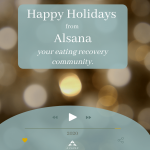Five tips for maintaining recovery in 2021 - Guest Post
Our guest blogger, Jill Sechi MS, RDN, LD, CEDRD-S, is one of the few dietitians in Houston who is board certified as a CEDRD-S. She also happens to be very knowledgeable and kind. When we asked her to share her thoughts on navigating the new year she didn’t hesitate! Her experience and expertise in the eating disorder field are extensive, and we are happy that she was willing to share a bit of that wisdom with us.

New Year? Yes, Please!
“The traffic, the boss, the baby, the dog! That does it! 2021 take me away!” If you can remember the “Calgon Bath Powder” commercial from years ago, this statement might resonate with you still in the throes of a pandemic; or perhaps in the recovery process of an eating disorder. Sinking into a nice, soothing bubble bath will make this all go away. Just like flipping the calendar to 2021, 2020 will be magically behind us. Worries: gone. We started 2020 with the slogan of “20/20 vision,” and the year was set to be extraordinary. Well, this has definitely been an extraordinary year without clarity and many unknowns, to say the least.
Eating disorder recovery can often take years, even if the development seemed to “appear” overnight. No different than this pandemic. Suddenly, we are canceling life as we know it in March only to turn around and have another “wave” of outbreaks with the colder weather in October. We have some hope with a vaccine on its way, yet the vaccine will only be available for those most vulnerable or necessary first. They say life as we know it may not be back to normal until late 2021. Or will it ever return to the normal we once knew? The process feels like there will be no end in sight. Life feels a bit hopeless.
We understand that when an eating disorder is “caught” within the first year, the greater the outcome of someone making a full recovery. However, many have been struggling with disordered behaviors for years. Once diagnosed and the treatment process begins, many say, “I just want my life back,” as they attend weekly nutrition and therapy sessions, “have to follow a meal plan,” or perhaps need to attend a higher level of care facility for more support. Time, energy, and money feel like they are continuously drained. The road ahead seems blurry or out of focus. 20/20 vision, going, going, gone.
So dreaming for the calendar to flip to a new year or thinking about sinking into a warm bubble bath to end the constant noise of life will just “make it go away” makes sense. Those thoughts help bring hope for the future, calmness to the feelings of fear or doubt, and soothing to a worn-down mind and body.
Recovery is just not that simple. Even if we thought 2020 would bring us a “20/20 vision” only to find that we are ending the year needing bifocal lenses, we could still hold hope and reassurance that recovery is possible.
Here are five ways to hold hope for recovery in the new year.
Yes, they take work, diligence, and a splash of grit:
- Keep consistent with your support system. This might include your dietitian, therapist, medical doctor, family members, and even little fur babies (animals). Recovery doesn’t just happen in a few weeks. The process generally takes one to two years. Sometimes longer. Sometimes less. Your network of loved ones and treatment professionals will help you reach full recovery with the tools and encouragement to keep going
- During social isolation, continue to nourish your relationships with people -not your eating disorder. Have online game nights, facetime a friend for meals, or write an “old fashioned letter” and drop it in the mail (did you ever have a pen pal growing up?).
- Feed your mind with the good stuff. Keep track of evidence-based care and education about effectively treating eating disorders. There are wonderful podcasts, clinicians who write blogs, YouTube videos, and books to keep your mind on what really works and is effective in the long run.
- Nourish your mind and body through journaling, honoring your meal plan, and challenging disordered eating thoughts around food and behaviors.
- Reflect consistently on your recovery process. Recovery is often seen in the months, not the weeks that go by. Create a recovery journal to review from time to time when the process becomes discouraging and overwhelming.
One can be fully recovered from an eating disorder. Recovery IS possible. Hang in there. Hold hope for the amazing adventures that lie ahead-adventures with much more in-depth insight and understanding of yourself and an unearthing of strong and courageous you.
As long as you have a plan and support, you got this! Here’s to a New Year. Let’s take in 2021! Cheers!

About our guest author: Jill Sechi MS, RDN, LD, CEDRD-S
Based out of Houston, TX, Jill is trained as a wellness coach. She is one of the few dietitians in Houston who is board certified as a CEDRD-S. Her primary focus over the last decade has been disordered eating, eating disorders, and weight concerns. She has also worked with Houston Eating Disorders Center providing nutrition therapy at PHP/IOP LOCs. Currently, Jill is in her private practice. She runs a virtual BED group and provides dual sessions (nutrition and therapy) with Meredith Riddick, LPC-S, CEDS-S through A Collaborative Approach.
Jill volunteers with IAEDP as part of a multidisciplinary team reviewing and approving applications for those obtaining their certification in eating disorders. She is a speaker and has presented at numerous conferences.
Our Recommended Articles
Start the road to recovery with Alsana.







